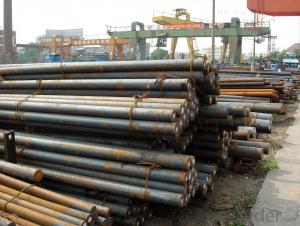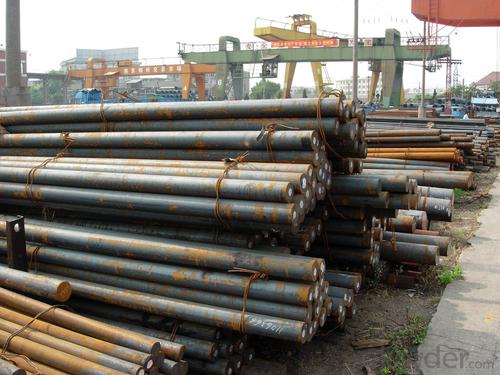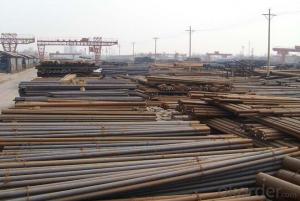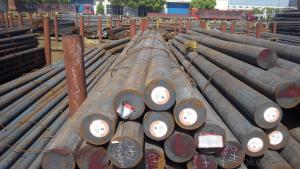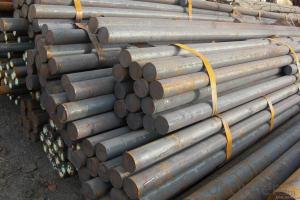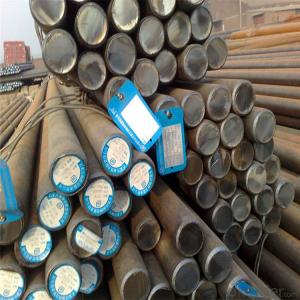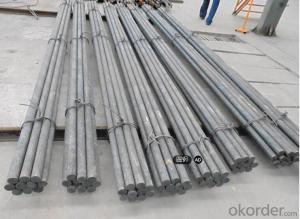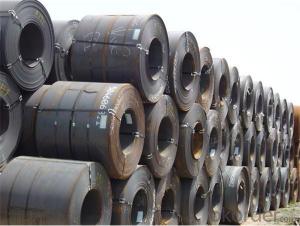Alloy Steel C45/S45C/45/1045 Carbon Round Steel
- Loading Port:
- China main port
- Payment Terms:
- TT or LC
- Min Order Qty:
- 25 m.t.
- Supply Capability:
- 10000 m.t./month
OKorder Service Pledge
OKorder Financial Service
You Might Also Like
Specification
The details of our Steel
1. Produce Standard: as the GB, AISI, ASTM, SAE, EN, BS, DIN, JIS Industry Standard
2. Produce processes: Smelt Iron -EAF smelt Billet - ESR smelt Billet -Hot rolled or forged get the steel round bar and plate
3. Heat treatment:
Normalized / Annealed / Quenched+Tempered
4. Quality assurance:
All order we can received Third party inspection, You can let SGS, BV,.. and others test company test and inspect our products before Goods shipping.
Product information
Chemical Composition(GB)%
standard | C | Si | Mn | P | S | Ni | Cr | Cu |
45 | 0.42-0.50 | 0.17-0.37 | 0.50-0.80 | ≤0.035 | ≤0.035 | ≤0.30 | ≤0.15 | ≤0.25 |
S45C | 0.42-0.48 | 0.15-0.35 | 0.60-0.90 | ≤0.030 | ≤0.035 | ≤0.20 | ≤0.20 | ≤0.230 |
Heat Treatment
Item | Temperature ℃ | Hardness |
normalizing | 850-870 | 170-217HBS |
Characterstics
1.Commonly used in carbon quenched and tempered steels |
2.Higher strength and better cutting processability |
Applications
1.Suitable for cold stamping die wedge, screw, plate, etc |
2.Other parts of cold work mould |
3.Used for hot forging, die casting, hot stamping and hot mould parts |
Product show

Workshop show

- Q: What are the key properties of special steel?
- Special steel has several key properties that set it apart from regular steel. These include high strength, excellent corrosion resistance, good wear resistance, and superior heat resistance. Special steel is also characterized by its ability to withstand extreme temperatures and pressure, making it suitable for critical applications in industries such as aerospace, automotive, and construction. Additionally, special steel can be easily machined and welded, allowing for greater versatility in manufacturing processes.
- Q: How does special steel contribute to the chemical industry?
- Special steel plays a crucial role in the chemical industry by offering superior resistance to corrosion, high temperatures, and pressure. It is used in the construction of equipment such as reactors, distillation columns, and pipelines, ensuring the safe containment and transportation of highly corrosive or hazardous chemicals. Additionally, special steel's exceptional strength and durability allow for longer service life and reduced maintenance costs, further enhancing the efficiency of chemical processes.
- Q: How does special steel contribute to the food processing aftermarket industry?
- Special steel plays a crucial role in the food processing aftermarket industry by offering several important benefits that contribute to the overall efficiency, safety, and productivity of food processing equipment. Firstly, special steel is known for its exceptional corrosion resistance properties. In the food processing industry, where equipment comes into contact with various acidic and corrosive substances, using special steel ensures that the machinery remains resistant to rust and contamination. This, in turn, helps maintain the hygiene and quality standards of food processing operations, reducing the risk of foodborne illnesses and contamination. Secondly, special steel possesses high strength and durability, enabling food processing equipment to withstand the demanding conditions of heavy usage and continuous operations. The robustness of special steel ensures that the equipment remains reliable, minimizing the risk of breakdowns or malfunctions during critical production processes. This leads to increased operational efficiency, reduced downtime, and improved production output. Furthermore, special steel can be tailored to specific applications, allowing manufacturers to design and produce equipment that meets the unique requirements of the food processing industry. Special steel alloys can be customized to possess specific properties such as heat resistance, wear resistance, or hardness, depending on the specific processing needs. This versatility ensures that the equipment can handle different types of food products, processing techniques, and operating conditions, resulting in enhanced versatility and adaptability in the food processing aftermarket industry. Additionally, special steel's compatibility with various cleaning and sterilization processes makes it ideal for food processing equipment. The material can withstand high-temperature cleaning methods, such as steam or chemical cleaning, without deteriorating or losing its structural integrity. This ease of cleaning and sterilization contributes to maintaining the highest standards of hygiene and sanitation in the food processing industry. In conclusion, special steel's corrosion resistance, strength, durability, customization options, and compatibility with cleaning processes make it an invaluable material in the food processing aftermarket industry. Its contribution to equipment reliability, hygiene, and productivity ensures that food processing operations can meet the stringent quality and safety standards required in this sector.
- Q: What are the requirements for special steel used in high-pressure applications?
- To ensure its durability and reliability under extreme conditions, special steel utilized in high-pressure applications must fulfill specific criteria. Some of the crucial requirements for this type of steel include the following: 1. Exceptional strength: The steel must possess extraordinary strength to withstand the intense forces and pressures it will encounter. This allows it to resist deformation and maintain its structural integrity. 2. Remarkable corrosion resistance: The steel needs to exhibit a high resistance to corrosion since it will frequently come into contact with aggressive fluids or gases in high-pressure environments. This prevents deterioration over time and helps sustain its performance and longevity. 3. Good weldability: The special steel employed in high-pressure applications should have good weldability in order to facilitate easy and efficient joining of different components. This ensures the overall integrity and reliability of the system. 4. Endurance against high temperatures: The steel must be capable of withstanding elevated temperatures without compromising its mechanical properties. This is particularly critical in applications where high-pressure fluids or gases are heated or where the steel is exposed to extreme heat sources. 5. Resistance to fatigue: The special steel should display a high resistance to fatigue failure, as it will often undergo cyclic loading and pressure fluctuations. This enables the steel to endure repeated stress and pressure cycles without developing cracks or failures. 6. Precise dimensional tolerance: The steel should possess precise dimensional tolerance to ensure proper fit and functionality within the high-pressure system. This helps minimize leakage or any potential weak points in the system. 7. Compliance with industry standards: The special steel used in high-pressure applications must meet relevant industry standards and specifications, such as those established by organizations like the American Society of Mechanical Engineers (ASME) or the American Petroleum Institute (API). This guarantees that the steel meets the required quality and performance standards. In summary, special steel for high-pressure applications must possess a combination of extraordinary strength, remarkable corrosion resistance, good weldability, endurance against high temperatures, resistance to fatigue, precise dimensional tolerance, and compliance with industry standards to ensure its suitability and reliability in demanding environments.
- Q: How does special steel contribute to the automotive safety?
- Special steel contributes to automotive safety in several ways. Firstly, it is used in the construction of the vehicle's structure, providing strength and rigidity to withstand impacts and collisions. This helps to protect the passengers by minimizing the deformation of the cabin area during a crash. Secondly, special steel is also used in the manufacturing of critical automotive components such as airbags, seat belts, and anti-lock braking systems, which are vital for occupant protection and accident prevention. Additionally, special steel is resistant to corrosion, which ensures the longevity and durability of safety features in a vehicle. Overall, the use of special steel in the automotive industry plays a significant role in enhancing the safety standards of vehicles and protecting the lives of both drivers and passengers.
- Q: How does special steel meet the requirements of specific industries?
- Special steel meets the requirements of specific industries by offering exceptional strength, durability, and resistance to corrosion, heat, and wear. Its unique composition and manufacturing process allow it to withstand extreme conditions and perform efficiently in diverse applications such as automotive, aerospace, energy, construction, and manufacturing. Additionally, special steel can be tailored to meet the specific needs of each industry, ensuring optimal performance and reliability in their respective operations.
- Q: How does special steel contribute to the automotive sector?
- Special steel plays a significant role in the automotive sector by contributing to the manufacturing and performance of various automotive components. It offers several benefits that enhance the overall quality, durability, and safety of vehicles. Firstly, special steel is known for its exceptional strength and toughness. This makes it ideal for producing critical automotive parts such as engine components, chassis, suspension systems, and safety reinforcements. These components require high strength to withstand the stresses and strains experienced during vehicle operation, ensuring the safety of passengers. Furthermore, special steel provides excellent resistance to wear, corrosion, and high-temperature environments. This makes it suitable for manufacturing parts like gears, bearings, shafts, and exhaust systems, which are exposed to harsh conditions. The use of special steel in these components improves their lifespan, reliability, and overall performance, reducing maintenance and replacement costs for vehicle owners. Moreover, special steel enables the lightweighting of vehicles. Automakers are constantly striving to reduce the weight of vehicles to enhance fuel efficiency and reduce emissions. Special steel alloys, such as high-strength low-alloy (HSLA) steel, offer a unique combination of strength and lightweight properties, allowing manufacturers to design lighter and more fuel-efficient vehicles without compromising on safety or performance. In addition to its mechanical properties, special steel also contributes to the automotive sector through its versatility in manufacturing processes. It can be easily formed, welded, and machined, enabling complex shapes and designs for automotive parts. This flexibility enhances the design possibilities and allows for innovative solutions to meet the evolving needs of the automotive industry. Overall, special steel plays a crucial role in the automotive sector by providing strength, durability, and lightweight properties to various components. Its use in critical parts ensures the safety of vehicles and passengers, while its resistance to wear and corrosion improves the longevity and performance of automotive systems. With the constant drive for fuel efficiency and innovation in the automotive industry, special steel continues to be an essential material in shaping the future of automobiles.
- Q: How does special steel contribute to the electrical conductivity of products?
- Special steel can contribute to the electrical conductivity of products in several ways. Firstly, special steel alloys can be formulated with specific chemical compositions that enhance their electrical conductivity. For example, adding elements such as copper, silver, or nickel to the steel can increase its electrical conductivity by providing more pathways for the flow of electric current. Additionally, the microstructure of special steel can be manipulated to improve electrical conductivity. By controlling the grain size and orientation of the steel, it is possible to reduce the resistance to the flow of electrons, thereby increasing the overall conductivity of the material. Furthermore, special steel can be heat treated or subjected to other processes to enhance its electrical conductivity. Heat treatment techniques like annealing or tempering can help to remove impurities and improve the crystal structure of the steel, resulting in improved electrical conductivity. Moreover, special steel can also be designed to have low magnetic permeability, which means it exhibits less resistance to the flow of magnetic fields. This property is beneficial for applications where electromagnetic interference needs to be minimized, such as in electrical connectors or transformers. In summary, special steel contributes to the electrical conductivity of products through various means, including chemical composition, microstructural control, heat treatment, and low magnetic permeability. By optimizing these factors, special steel can significantly enhance the performance of electrical components and systems.
- Q: What is the purpose of cold drawing in special steel production?
- Cold drawing is utilized in special steel production with the aim of enhancing the mechanical properties and dimensional accuracy of the steel. This technique involves pulling the steel through a die at room temperature, which leads to a reduction in the cross-sectional area and an increase in the length of the steel. By undergoing this process, the microstructure of the steel is refined, resulting in improved strength, hardness, and toughness. Furthermore, cold drawing has the ability to improve the surface finish and straightness of the steel, ensuring precise dimensions and making it suitable for a wide range of applications that require high-quality steel. In summary, cold drawing plays a vital role in improving the performance and quality of special steel, making it more dependable and efficient in various industrial sectors.
- Q: What are the main applications of special steel in the textile industry?
- Special steel is commonly used in the textile industry for various applications. Some of the main applications include the production of textile machinery components such as needles, pins, and cylinders, which require high strength and durability. Special steel is also used in the manufacturing of textile cutting tools, such as blades and scissors, due to its ability to maintain sharpness and resist wear. Additionally, special steel is employed in the production of textile weaving and knitting machine parts, providing reliable performance and improved efficiency in these processes.
Send your message to us
Alloy Steel C45/S45C/45/1045 Carbon Round Steel
- Loading Port:
- China main port
- Payment Terms:
- TT or LC
- Min Order Qty:
- 25 m.t.
- Supply Capability:
- 10000 m.t./month
OKorder Service Pledge
OKorder Financial Service
Similar products
Hot products
Hot Searches
Related keywords
